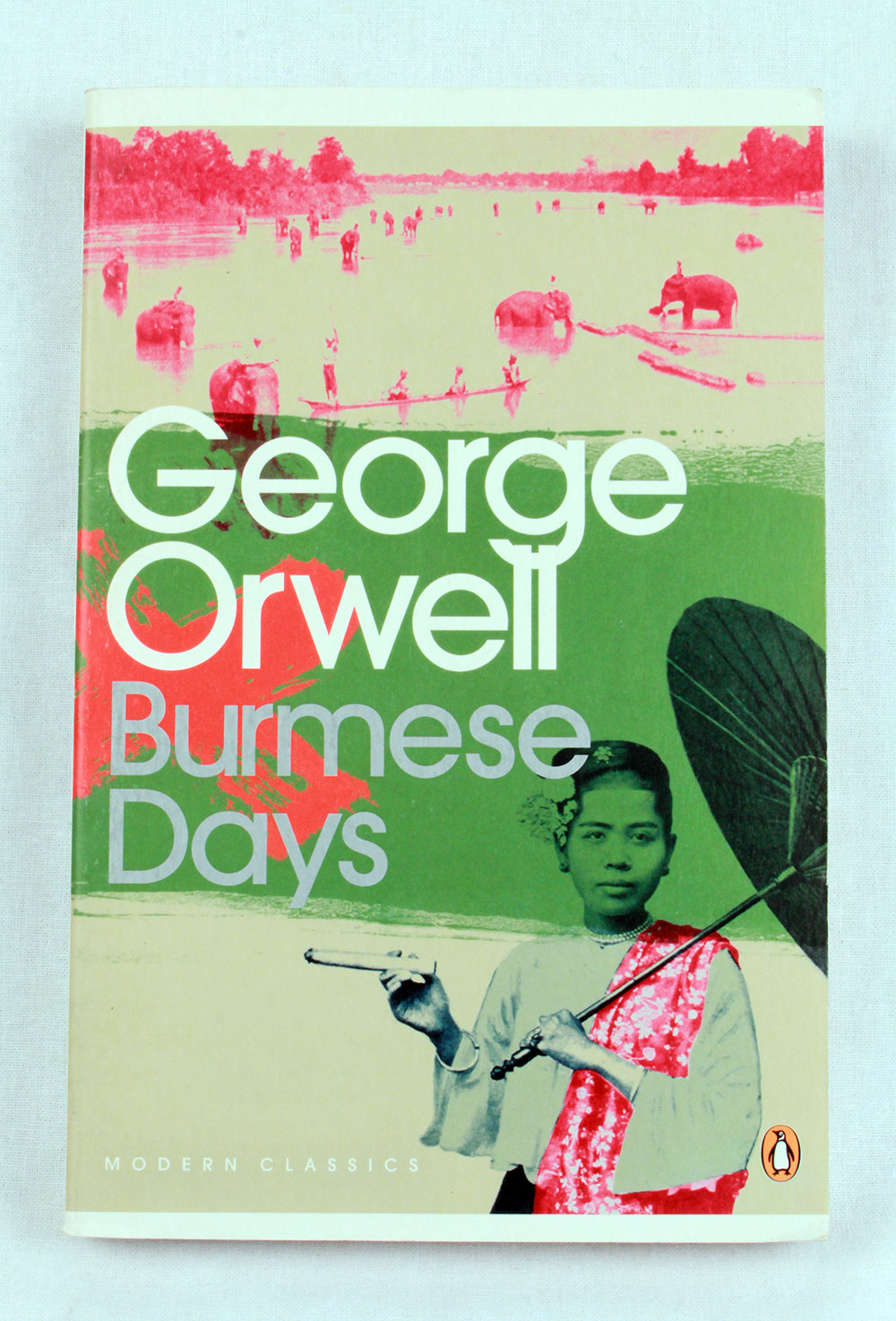Burmese Days | George Orwell
₨ 638.40
Burmese Days is a novel by English writer George Orwell. It was first published in the United Kingdom in 1934. It is a tale from the waning days of British colonialism, when Burma was ruled from Delhi as a part of British India – “a portrait of the dark side of the British Raj.” At its centre is John Flory, “the lone and lacking individual trapped within a bigger system that is undermining the better side of human nature.” Orwell’s first novel, it describes “corruption and imperial bigotry” in a society where, “after all, natives were natives—interesting, no doubt, but finally…an inferior people”.
Burmese Days is a novel by English writer George Orwell. It was first published in the United Kingdom in 1934. It is a tale from the waning days of British colonialism, when Burma was ruled from Delhi as a part of British India – “a portrait of the dark side of the British Raj.” At its centre is John Flory, “the lone and lacking individual trapped within a bigger system that is undermining the better side of human nature.” Orwell’s first novel, it describes “corruption and imperial bigotry” in a society where, “after all, natives were natives—interesting, no doubt, but finally…an inferior people”.
Because of concerns that the novel might be potentially libellous, that Katha was described too realistically, and that some of the characters might be based on real people, it was first published “further afield”, in the United States. A British edition, with altered names, appeared a year later. When it was published in the 1930s, Orwell’s harsh portrayal of colonial society was felt by “some old Burma hands” to have “rather let the side down”. In a letter from 1946, Orwell said “I dare say it’s unfair in some ways and inaccurate in some details, but much of it is simply reporting what I have seen”.
Plot Summary
Burmese Days is set in 1920s imperial Burma, in the fictional district of Kyauktada, based on Kathar (formerly spelled Katha), a town where Orwell served. Like Kyauktada it is the head of a branch railway line above Mandalay on the Ayeyarwady (Irrawaddy) River. As the story opens, U Po Kyin, a corrupt Burmese magistrate, is planning to destroy the reputation of the Indian Dr Veraswami. The doctor’s main protection is his friendship with John Flory who, as a pukka sahib (European white man), has higher prestige. Dr Veraswami wants the privilege of becoming a member of the British club because he thinks that if his standing with the Europeans is good, U Po Kyin’s intrigues against him will not prevail. U Po Kyin begins a campaign to persuade the Europeans that the doctor holds disloyal, anti-British opinions, and believes anonymous letters with false stories about the doctor “will work wonders”. He even sends a threatening letter to Flory.
John Flory is a jaded 35-year-old teak merchant. Responsible three weeks of every month for the appropriation of jungle timber, he is friendless among his fellow Europeans and is unmarried. He has a ragged crescent of a birthmark on his face. Flory has become disillusioned with his lifestyle, living in a tiresome expatriate community centred round the European Club in a remote part of the country. On the other hand, he has become so embedded in Burma that it is impossible for him to leave and return to England. Veraswami and Flory are good friends, and Flory often visits the doctor for what the latter delightedly calls “cultured conversation”. In these conversations Flory details his disillusionment with the empire. The doctor for his part becomes agitated whenever Flory criticises the Raj and defends the British as great administrators who have built an efficient and unrivalled empire. Flory dismisses these administrators as mere moneymakers, living a lie, “the lie that we’re here to uplift our poor black brothers instead of to rob them”. Though he finds release with his Burmese mistress, Flory is emotionally dissatisfied. “On the one hand, Flory loves Burma and craves a partner who will share his passion, which the other local Europeans find incomprehensible; on the other hand, for essentially racist reasons, Flory feels that only a European woman is acceptable as a partner”.
Flory’s dilemma seems to be answered when Elizabeth Lackersteen, the orphaned niece of Mr Lackersteen, the local timber firm manager, arrives. Flory saves her when she thinks she is about to be attacked by a small water buffalo. He is immediately taken with her and they spend some time getting close, culminating in a highly successful shooting expedition. After several misses Elizabeth shoots a pigeon, and then a flying bird, and Flory shoots a leopard, promising the skin to Elizabeth as a trophy. Lost in romantic fantasy, Flory imagines Elizabeth to be the sensitive non-racist he so much desires, the European woman who will “understand him and give him the companionship he needed”. He turns Ma Hla May, his pretty, scheming Burmese concubine, out of his house. Under the surface, however, Elizabeth is appalled by Flory’s relatively egalitarian attitude towards the natives, seeing them as “beastly” while Flory extols the virtues of their rich culture. She is frightened and repelled by the Burmese. Worse still are Flory’s interests in high art and literature, which remind Elizabeth of her fraudulent mother who died in disgrace in Paris of ptomaine poisoning as a result of living in squalid conditions while masquerading as a Bohemian artist. Despite these reservations, of which Flory is entirely unaware, she is willing to marry him to escape poverty, spinsterhood, and the unwelcome advances of her perpetually inebriated uncle.
Flory is about to ask her to marry him, but they are interrupted first by her aunt and secondly by an earthquake. Mrs Lackersteen’s interruption is deliberate because she has discovered that a military police lieutenant named Verrall is arriving in Kyauktada. As he comes from an extremely good family, she sees him as a better prospect as a husband for Elizabeth. Mrs Lackersteen tells Elizabeth that Flory is keeping a Burmese mistress as a deliberate ploy to send her to Verrall. Indeed, Flory had been keeping a mistress, but had dismissed her almost the moment Elizabeth had arrived. Elizabeth is appalled and falls at the first opportunity for Verrall, who is arrogant and ill-mannered to all but her. Flory is devastated and after a period of exile attempts to make amends by delivering to her the leopard skin. A bungled curing process has left the skin mangy and stinking and the gesture merely compounds his status as a poor suitor. When Flory delivers it to Elizabeth she accepts it regardless of the fact that it stinks and he talks of their relationship, telling her he still loves her. She responds by telling him that unfortunately the feelings aren’t mutual and leaves the house to go horse riding with Verrall. When Flory and Elizabeth part ways, Mrs Lackersteen orders the servants to burn the reeking leopard skin, representing the deterioration of Flory and Elizabeth’s relationship.
U Po Kyin’s campaign against Dr Veraswami turns out to be intended simply to further his aim of becoming a member of the European Club in Kyauktada. The club has been put under pressure to elect a native member and Dr Veraswami is the most likely candidate. U Po Kyin arranges the escape of a prisoner and plans a rebellion for which he intends that Dr Veraswami should get the blame. The rebellion begins and is quickly put down, but a native rebel is killed by acting Divisional Forest Officer, Maxwell. Uncharacteristically courageous, Flory speaks up for Dr Veraswami and proposes him as a member of the club. At this moment the body of Maxwell, cut almost to pieces with dahs by two relatives of the man he had shot, is brought back to the town. This creates tension between the Burmese and the Europeans which is exacerbated by a vicious attack on native children by the spiteful arch-racist timber merchant, Ellis. A large but ineffectual anti-British riot begins and Flory becomes the hero for bringing it under control with some support by Dr Veraswami. U Po Kyin tries to claim credit but is disbelieved and Dr Veraswami’s prestige is restored.
Verrall leaves Kyauktada without saying goodbye to Elizabeth and she falls for Flory again. Flory is happy and plans to marry Elizabeth. However, U Po Kyin has not given up. He hires Flory’s former Burmese mistress to create a scene in front of Elizabeth during the sermon at church. Flory is disgraced and Elizabeth refuses to have anything more to do with him. Overcome by the loss and seeing no future for himself, Flory kills first his dog, and then himself.
Dr Veraswami is demoted and sent to a different district and U Po Kyin is elected to the club. U Po Kyin’s plans have succeeded and he plans to redeem his life and cleanse his sins by financing the construction of pagodas. He dies of apoplexy before he can start building the first pagoda and his wife envisages him returning to life as a frog or rat. Elizabeth eventually marries Macgregor, the deputy commissioner, and lives happily in contempt of the natives, who in turn live in fear of her, fulfilling her destiny of becoming a “burra memsahib”, a respectful term given to white European women.






Reviews
There are no reviews yet.